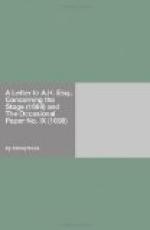I have proposed it as an Argument in Defence of a Regular Stage, that it lies on its Adversaries to prove it against Law or Scripture, and so might leave it justify’d till some Person or other make the Discovery to the World: But because ’tis my Opinion ’tis utterly impossible, I shall give you some Reasons why I think it not only lawful in it self but very necessary in this populous City. And, First, if we consider the Matter that ought to be represented, whether it be Tragedy or Comedy; there is nothing in either that can offend Religion or Good Manners.
Tragedy is a Representation of an Action by some Great Man, teaching us to regulate our Passions with exactness, and by shewing the strange and differing Accidents of Life, to which the most important Persons are subject; proving to us that Vice never goes unpunished; and that true Happiness does not chiefly consist in the Enjoyment of this World.
Comedy is a Representation of common Conversation; and its Design is to represent things Natural; to shew the Faults of Particular Men in order to correct the Faults of the Publick, and to amend the People thro’ a fear of being expos’d, with this Observation, That the Ridiculous of the Stage is to be only a Copy of the Ridiculous found in Nature.
In short, ’tis the Property both of Tragedy and Comedy to instruct: The Characters in both are to be Natural; and the Persons concern’d in the whole Action, are to be such whose Vertues ought to provoke us to an Emulation, or whose Vices ought to deter us from imitating their Example, The Language and Sentiments are to be suitable to each Character: A Wife, Good, and Great Man is to say nothing but what is natural for such a one to say: The Gallant Man is to appear with all the Qualities of a Man of Honour: and the Fool in his proper colour’d Coat. The Vices of the Wicked are not to be represented so nicely, as punish’d severely; that is, a Vicious Person is not to be allow’d to plead in favour of his Vices, or to represent his Villany so calmly as to tempt any Man to try Practices in another Place. Vice is only to be brought there to be condemn’d, and the reason of this is, that our Terrour may be excited, and all our Passions vent themselves with Strength and Reason. Our Pity is not to be extended in a wrong place. In short, The Disposition of the play is to be such that all the Characters have a proper Effect with us. Our Fear, Love, and Anger are to be exerted with Justice; and we are to learn from a just Fable how to behave our selves in earnest. Thus may we exercise our Souls by examining our reasonable Faculties, and try how we can love to extremity, and yet without a Fault; to be angry and sin not; to be just without partiality, and rejoyce with them that rejoyce. We are there instructed to Love, Hate, and Fear within measure, how we may be Men without debasing our Souls; and all this by moving Examples, which in spite of Stubbornness, will force its Impressions;




